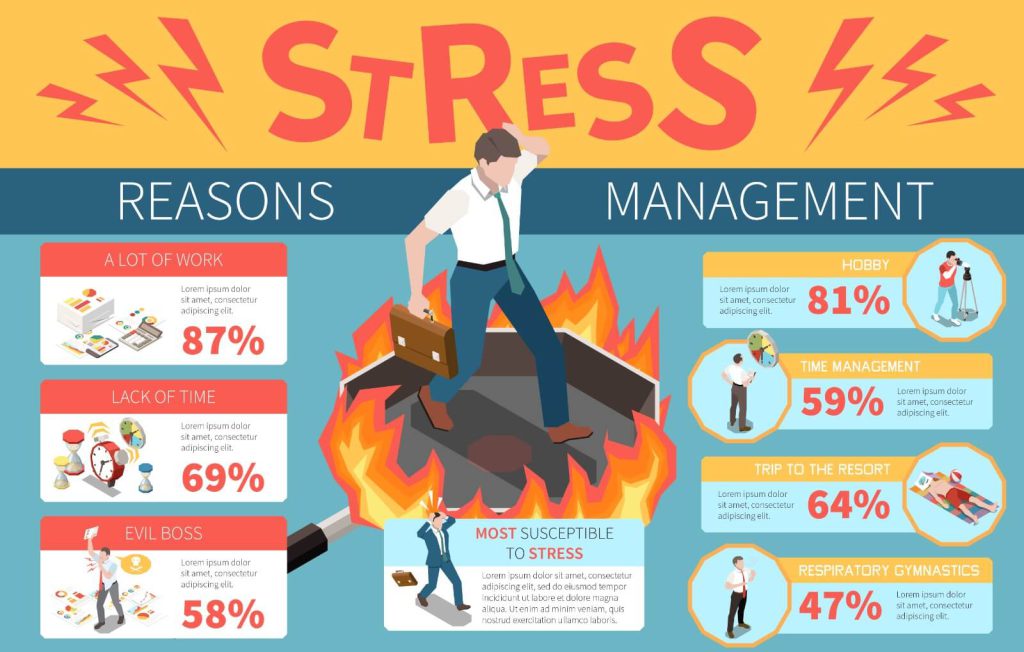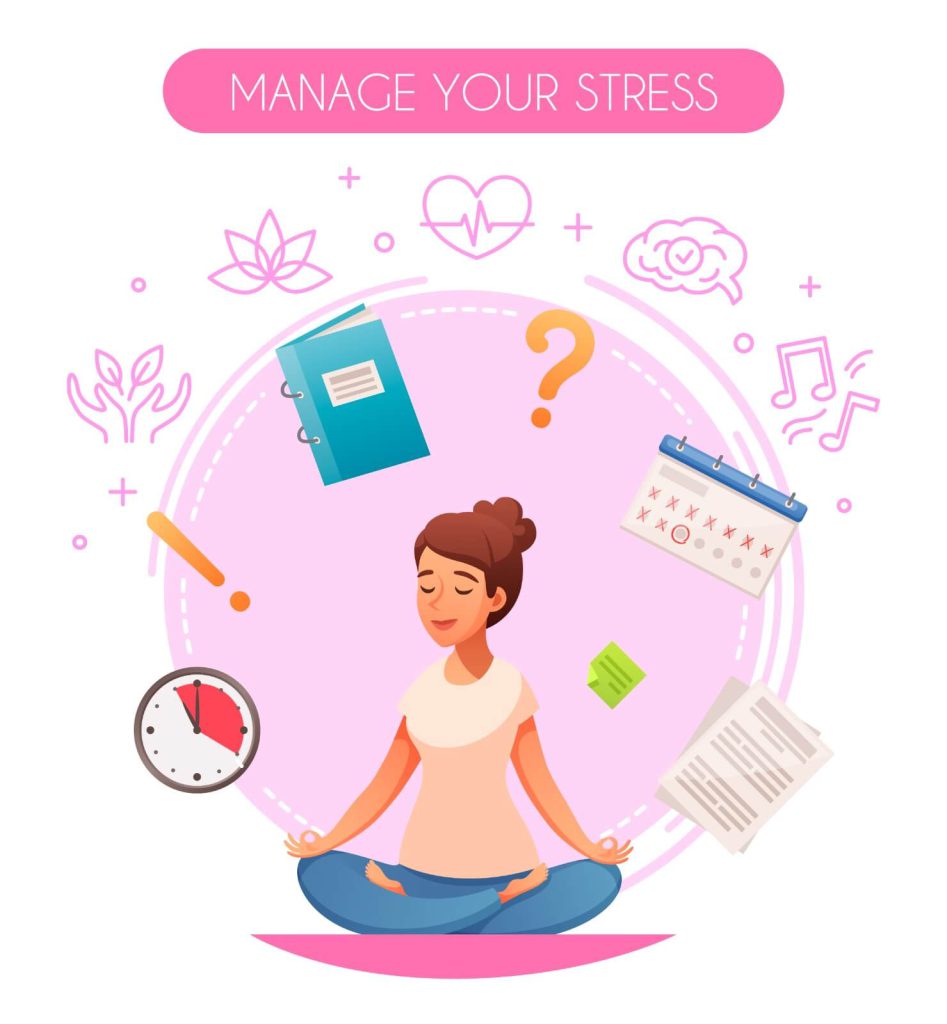Stress is a natural response that occurs when individuals perceive a demand or threat that exceeds their ability to cope effectively. It is the body’s way of reacting to challenging or potentially dangerous situations. It can be triggered by various factors, including external events, thoughts, or internal pressures.
Stress Response
When individuals encounter stress, their bodies undergo a physiological and psychological response known as the stress response or “fight-or-flight” response. This response involves the release of stress hormones, such as adrenaline and cortisol, which prepare the body to take action in response to the perceived threat. This response can have both short-term and long-term effects on the body and mind.
Short-term stress can be beneficial and can help individuals perform under pressure or in emergency situations. However, when stress becomes chronic or overwhelming, it can have negative effects on physical and mental health.
Prolonged or excessive stress can contribute to a range of health problems, including:
Physical Effects: Chronic stress can lead to symptoms such as headaches, muscle tension, fatigue, sleep disturbances, digestive issues, weakened immune system, high blood pressure, and increased risk of cardiovascular disease.
Mental and Emotional Effects: It can impact mental well-being and contribute to symptoms such as anxiety, irritability, mood swings, difficulty concentrating, memory problems, feelings of overwhelm or helplessness, and a decreased sense of enjoyment in activities.
Behavioral Effects: It can influence behavior and lead to unhealthy coping mechanisms such as overeating or undereating, increased alcohol or drug use, social withdrawal, procrastination, and difficulty managing responsibilities.
Causes of Stress
Stress can be caused by a wide range of factors. Here are some common causes:
Work: Heavy workloads, long hours, demanding deadlines, a lack of control over job responsibilities, conflicts with colleagues or superiors, and job insecurity can contribute to it.
Personal Relationships: Difficulties or conflicts within personal relationships, such as problems with a spouse or partner, family conflicts, or social conflicts, can be significant sources of stress.
Financial Pressures: Financial problems, including debt, job loss, unexpected expenses, or the inability to meet basic needs, can cause it.
Major Life Changes: Significant life events or transitions, such as getting married, having a child, moving to a new city, starting a new job, or experiencing the loss of a loved one, can be stressful, even if they are positive changes.

Academic Pressure: Students may experience pressure due to academic demands, exams, deadlines, performance expectations, and the pressure to succeed.
Health Issues: Dealing with personal health problems, chronic illnesses, or caring for a loved one with health issues can lead to it.
Environmental Stressors: Factors in the environment, such as noise, pollution, overcrowding, or living in an unsafe neighborhood, can contribute to it.
Traumatic Events: Experiencing or witnessing traumatic events, such as accidents, natural disasters, violence, or abuse, can cause acute or post-traumatic stress.
Lack of Work-Life Balance: Difficulty balancing work, personal life, and self-care can lead to feelings of overwhelm.
Internal Pressures: Self-imposed pressures, perfectionism, high self-expectations, and negative self-talk can contribute to it.
Symptoms of Stress
Here are some common physical, emotional, cognitive, and behavioral symptoms:
Physical Symptoms:
- Headaches or migraines
- Muscle tension or stiffness
- Fatigue or low energy
- Sleep disturbances, such as insomnia or excessive sleeping
- Digestive issues, like stomachaches, nausea, or changes in appetite
- Rapid heartbeat or chest tightness
- Sweating or clammy hands
- Frequent infections or weakened immune system
- Changes in sexual desire or performance
Emotional Symptoms:
- Irritability or short temper
- Mood swings or emotional instability
- Anxiety or restlessness
- Feeling overwhelmed or unable to cope
- Increased sensitivity to criticism or rejection
- Low self-esteem or feelings of worthlessness
- Feeling on edge or constantly alert
- Depression or feelings of sadness
- Loss of interest or enjoyment in previously pleasurable activities
- Emotional outbursts or crying spells
Cognitive Symptoms:
- Racing thoughts or constant worrying
- Difficulty concentrating or making decisions
- Memory problems or forgetfulness
- Feeling disorganized or scattered
- Poor judgment or lack of perspective
- Mind going blank or difficulty expressing thoughts
- Heightened self-doubt or negative self-talk
- Lack of focus or mental clarity
- Decreased creativity or problem-solving abilities
- Intrusive thoughts or excessive worrying about the future
Behavioral Symptoms:
- Changes in appetite, such as overeating or undereating
- Increased use of substances like alcohol, tobacco, or drugs
- Restlessness or fidgeting
- Social withdrawal or isolation
- Neglecting responsibilities or procrastination
- Changes in sleep patterns or insomnia
- Impulsive or reckless behavior
- Avoidance of situations that trigger stress
- Nail-biting, teeth grinding, or other nervous habits
- Difficulty in relaxing or finding enjoyment in leisure activities
Impact of Stress on Mental Health
It can have a significant impact on mental health, exacerbating existing mental health conditions and contributing to the development of new ones. Here are some ways in which it can affect mental health:
Anxiety Disorders: Chronic stress can contribute to the development or worsening of anxiety disorders, such as generalized anxiety disorder (GAD), panic disorder, social anxiety disorder, or post-traumatic stress disorder (PTSD). It can heighten feelings of worry, fear, and unease, leading to persistent anxiety symptoms.
Depression: Prolonged or excessive stress can increase the risk of developing depression. It can disrupt brain chemistry, impact mood-regulating neurotransmitters, and contribute to feelings of sadness, hopelessness, and loss of interest or pleasure in activities.

Burnout: Chronic work-related stress can lead to burnout, a state of physical and emotional exhaustion, cynicism, and reduced effectiveness in one’s professional role. Burnout is characterized by feelings of overwhelm, emotional detachment, and a sense of being drained or depleted.
Substance Abuse: Some individuals may turn to substance abuse as a way to cope with stress, seeking temporary relief or escape from their difficulties. Substance abuse can worsen mental health symptoms and increase the risk of developing substance use disorders.
Sleep Disorders: It can disrupt sleep patterns and contribute to the development of sleep disorders, such as insomnia or hypersomnia. Lack of quality sleep can further impact mental health, leading to irritability, fatigue, difficulty concentrating, and emotional instability.
Cognitive Functioning: Chronic stress can affect cognitive functioning, including memory, attention, and decision-making abilities. It may impair concentration, reduce cognitive flexibility, and hinder problem-solving skills.
Relationship Problems: It can strain relationships, leading to conflicts, decreased communication, and a sense of disconnect. This can further contribute to stress and negatively impact mental well-being.
Increased Vulnerability: Prolonged or severe stress weakens the body’s ability to cope with mental health challenges, making individuals more vulnerable to the onset or recurrence of mental health conditions.
Strategies for Stress Management
It’s important to manage it effectively to minimize its negative impact.
Healthy Lifestyle: Engaging in regular physical exercise, maintaining a balanced diet, getting enough sleep, and practicing relaxation techniques like deep breathing or meditation can help reduce stress levels.
Time Management: Prioritizing tasks, setting realistic goals, and learning effective time management skills can help individuals feel more in control and reduce feelings of overwhelm.
Social Support: Seeking support from friends, family, or support groups can provide comfort, understanding, and practical assistance during times of stress.
Stress Reduction Techniques: Engaging in activities that promote relaxation and stress reduction, such as yoga, mindfulness, hobbies, or engaging in enjoyable activities, can help manage stress.
Seeking Professional Help: If it becomes chronic or significantly impacts daily functioning, it may be helpful to seek support from a healthcare provider or mental health professional who can provide guidance and assistance.

Solutions for Stress
Managing stress effectively is crucial for maintaining overall well-being. Here are some strategies and techniques that can help in reducing and coping with stress:
Identify and Address Stressors: Start by identifying the specific situations, events, or factors that contribute to your stress. This awareness will allow you to better understand and address the root causes of stress in your life.
Practice Relaxation Techniques: Engage in relaxation techniques that help calm the mind and relax the body. Deep breathing exercises, meditation, progressive muscle relaxation, and mindfulness techniques can help reduce its level and promote a sense of calm.
Exercise Regularly: Physical activity is a natural stress reliever. Engage in regular exercise, such as walking, jogging, swimming, yoga, or any other form of physical activity that you enjoy. Exercise helps release endorphins, which are natural mood boosters.
Maintain a Healthy Lifestyle: Ensure you’re taking care of your physical well-being by getting enough sleep, eating a balanced diet, and avoiding excessive consumption of caffeine, alcohol, and unhealthy foods. A healthy body can better handle and manage stress.
Time Management and Prioritization: Learn effective time management techniques to prioritize tasks, set realistic goals, and avoid becoming overwhelmed. Breaking tasks into smaller, manageable steps can make them feel more achievable.
Social Support: Reach out to friends, family, or support groups. Talking to someone you trust about your stress can provide comfort, perspective, and potential solutions. Seek support from your loved ones and allow them to help and support you.
Engage in Activities You Enjoy: Set aside time for activities that bring you joy and relaxation. Engaging in hobbies, creative pursuits, or leisure activities can provide a much-needed break from it and promote a sense of fulfillment.
Practice Stress-Reducing Techniques: Experiment with stress-reducing techniques that work for you, such as listening to calming music, practicing aromatherapy, journaling, engaging in art or crafts, or spending time in nature.
Set Boundaries: Learn to say no when you feel overwhelmed or unable to take on additional responsibilities. Setting boundaries and managing your commitments can help reduce it and prevent burnout.
Seek Professional Help: If it becomes overwhelming or starts to significantly impact your daily functioning, consider seeking professional help. A mental health professional can provide guidance, support, and specific techniques tailored to your needs.
Remember that managing it is a personal journey, and it may take time to find the strategies that work best for you. Experiment with different techniques, be patient with yourself and seek support when needed. Taking proactive steps to manage it can have a positive impact on your overall well-being and quality of life.
Contact Brain Soul & You for a counseling session.
Read more blogs on Depression: Types, Symptoms, Causes & Treatment, How to Help Someone with Anxiety War or Anxiety Disorder, 5 Most Common Mental Disorders – Mental Health Terms | Part – 1
Love,
Saurabh Goel
Saurabh Goel
He is the Founder and CEO of the Training and Counselling Company ‘Brain Soul & You’. He is an NLP Wellness Coach, Life Coach, Brain analyst, and Trainer for Education, Corporate, and Entrepreneurship. For more than 7 years, he delivered presentations on entrepreneurship, mind programming, and motivation. He did his B.tech in IT and later choose to be a successful psychologist. He is helping people in various ways through his counseling and training sessions.


